
 |
|
Spanglish (2004) Cast: Paz Vega, Adam Sandler, Tea Leoni, Cloris Leachman, Sarah Steele, Shelbie Bruce, Ian Hyland, Angela Goethals, Allen Covert, Victoria Luna, Cecilia Suarez, Thomas Haden Church 2004 – 128 minutes Rated: Reviewed by Dustin Putman, December 9, 2004. 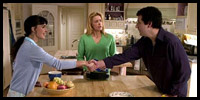 Written and directed by James L. Brooks (1997's "As Good as It Gets"), "Spanglish" is a dramedy of two halves. On the one side is a heartfelt and honest slice-of-life that rings true, and on the other is an occasionally embarrassing, over-the-top sitcom populated by one of the most despicably thoughtless characters to stink up a mainstream film in years.
Written and directed by James L. Brooks (1997's "As Good as It Gets"), "Spanglish" is a dramedy of two halves. On the one side is a heartfelt and honest slice-of-life that rings true, and on the other is an occasionally embarrassing, over-the-top sitcom populated by one of the most despicably thoughtless characters to stink up a mainstream film in years.
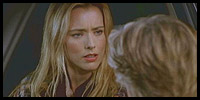 The character in question is Deborah Clasky (Tea Leoni), the fitness-conscious, out-of-work matriarch of a well-to-do Los Angeles family who is either a Manic Depressive or supremely evil. She is sexually frigid and uncaring toward her loyal husband, renowned chef John (Adam Sandler); she intentionally buys her slightly heavyset daughter, Bernice (Sarah Steele), clothes several sizes too small with the ulterior motive of making her feel bad about her appearance and, in effect, lose weight; and she barely has time to pay any attention at all to young son Georgie (Ian Hyland). Deborah blames her functioning alcoholic mother, Evelyn (Cloris Leachman), for her problems as a way of wrongfully freeing herself of responsibility, despite evidence that Evelyn is one of the saner, more compassionate people in her life. And, lest it be forgotten, Deborah happily cheats on John with a sexy realtor (Thomas Haden Church)—shades of 1999's "American Beauty"—and then has a self-pitying cry fest when she starts to feel guilty. Does Deborah really love John? It's hard to say, since she doesn't really appear to be capable of such a compassionate emotion. Why John fell in love with such a heartless, unstable creature to begin with stays a mystery from beginning to end.
The character in question is Deborah Clasky (Tea Leoni), the fitness-conscious, out-of-work matriarch of a well-to-do Los Angeles family who is either a Manic Depressive or supremely evil. She is sexually frigid and uncaring toward her loyal husband, renowned chef John (Adam Sandler); she intentionally buys her slightly heavyset daughter, Bernice (Sarah Steele), clothes several sizes too small with the ulterior motive of making her feel bad about her appearance and, in effect, lose weight; and she barely has time to pay any attention at all to young son Georgie (Ian Hyland). Deborah blames her functioning alcoholic mother, Evelyn (Cloris Leachman), for her problems as a way of wrongfully freeing herself of responsibility, despite evidence that Evelyn is one of the saner, more compassionate people in her life. And, lest it be forgotten, Deborah happily cheats on John with a sexy realtor (Thomas Haden Church)—shades of 1999's "American Beauty"—and then has a self-pitying cry fest when she starts to feel guilty. Does Deborah really love John? It's hard to say, since she doesn't really appear to be capable of such a compassionate emotion. Why John fell in love with such a heartless, unstable creature to begin with stays a mystery from beginning to end.
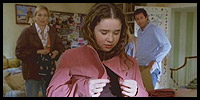 The dysfunctions of the Clasky family are observed by live-in maid Flor (Paz Vega), who has emigrated from Mexico in hopes of providing a better life for her bright daughter, Cristine (Shelbie Bruce). Flor doesn't speak a word of English at the onset, creating a tricky language barrier between herself and her employers, but she isn't stupid and knows exactly what is going on around her. As Flor attempts to teach herself the language, and bilingual Cristine translates her words for the Clasky's, she becomes increasingly suspect that Deborah is taking advantage of her and in the process stealing Cristine away from her. All Flor wants are more opportunities for her daughter, but she isn't so sure the family surrounding them is a healthy one to be involved with.
The dysfunctions of the Clasky family are observed by live-in maid Flor (Paz Vega), who has emigrated from Mexico in hopes of providing a better life for her bright daughter, Cristine (Shelbie Bruce). Flor doesn't speak a word of English at the onset, creating a tricky language barrier between herself and her employers, but she isn't stupid and knows exactly what is going on around her. As Flor attempts to teach herself the language, and bilingual Cristine translates her words for the Clasky's, she becomes increasingly suspect that Deborah is taking advantage of her and in the process stealing Cristine away from her. All Flor wants are more opportunities for her daughter, but she isn't so sure the family surrounding them is a healthy one to be involved with.
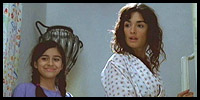 Billed as an Adam Sandler headliner, "Spanglish" is actually an ensemble picture, with Flor coming the closest to being the lead character. She is the one writer-director James L. Brooks follows most closely, and with the most insight into the dilemma she faces by not speaking the native language all around her. As played by newcomer (to American screens) Paz Vega, Flor is intelligent, attentive, and driven to do whatever it takes to build a better life for Cristine. She is also a gorgeous charmer, and Vega's breakthrough performance is so very good that the film is almost worth recommending for her alone. The operative word is "almost."
Billed as an Adam Sandler headliner, "Spanglish" is actually an ensemble picture, with Flor coming the closest to being the lead character. She is the one writer-director James L. Brooks follows most closely, and with the most insight into the dilemma she faces by not speaking the native language all around her. As played by newcomer (to American screens) Paz Vega, Flor is intelligent, attentive, and driven to do whatever it takes to build a better life for Cristine. She is also a gorgeous charmer, and Vega's breakthrough performance is so very good that the film is almost worth recommending for her alone. The operative word is "almost."
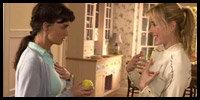 Flor's individual journey is an accurate, affecting one, but many of the scenes with the Clasky's, particularly Deborah, ring with an equal level of falseness. The family falls victim to either being too cute—grandma Evelyn and grandson Georgie while away their time singing decidedly mature, boozy ballads together—or on the verge of an emotional meltdown, depending on whichever direction—comedy or tearjerker—Brooks wishes to take at any given moment. There are moments that do work, especially the heavy ones between John and insecure daughter Bernice, with both actors—Adam Sandler (2004's "50 First Dates") and noteworthy debuter Sarah Steele—perfecting the delicate ways in which parents and children interact with each other during times of discord and vulnerability. Where "Spanglish" goes wrong is in introducing the terrible things Deborah does to her family and then lacking the courage of its convictions to deal with them head-on. Most of the mistakes she makes are never dealt with, nor does Deborah even begin to make amends for her wrongs or try to connect with her children.
Flor's individual journey is an accurate, affecting one, but many of the scenes with the Clasky's, particularly Deborah, ring with an equal level of falseness. The family falls victim to either being too cute—grandma Evelyn and grandson Georgie while away their time singing decidedly mature, boozy ballads together—or on the verge of an emotional meltdown, depending on whichever direction—comedy or tearjerker—Brooks wishes to take at any given moment. There are moments that do work, especially the heavy ones between John and insecure daughter Bernice, with both actors—Adam Sandler (2004's "50 First Dates") and noteworthy debuter Sarah Steele—perfecting the delicate ways in which parents and children interact with each other during times of discord and vulnerability. Where "Spanglish" goes wrong is in introducing the terrible things Deborah does to her family and then lacking the courage of its convictions to deal with them head-on. Most of the mistakes she makes are never dealt with, nor does Deborah even begin to make amends for her wrongs or try to connect with her children.
 The disastrous treatment of Deborah comes close to single-handedly destroying "Spanglish" all by itself. Tea Leoni (2001's "Jurassic Park III") is placed in an unattractive light—physically and mentally—as Deborah, and eventually dissolves into a sniveling, screeching idiot the viewer has no reason in the world to sympathize with. When she cries for the duration of the last half-hour, it is not because she regrets her mistakes so much as she seems to be worried about herself and her own problems that led her to this low point. Leoni and Adam Sandler, mumbling through his lines in an earnest but uneven dramatic performance, might as well be strangers acting off of each other. They are not believable as a married couple, nor is there any insight into, at the beginning of their marriage, why John was attracted to her. Save for the relationship between John and Bernice, the connections between the Clasky parents and offspring are vaguely written at best, with the kids disappearing for long stretches of the running time.
The disastrous treatment of Deborah comes close to single-handedly destroying "Spanglish" all by itself. Tea Leoni (2001's "Jurassic Park III") is placed in an unattractive light—physically and mentally—as Deborah, and eventually dissolves into a sniveling, screeching idiot the viewer has no reason in the world to sympathize with. When she cries for the duration of the last half-hour, it is not because she regrets her mistakes so much as she seems to be worried about herself and her own problems that led her to this low point. Leoni and Adam Sandler, mumbling through his lines in an earnest but uneven dramatic performance, might as well be strangers acting off of each other. They are not believable as a married couple, nor is there any insight into, at the beginning of their marriage, why John was attracted to her. Save for the relationship between John and Bernice, the connections between the Clasky parents and offspring are vaguely written at best, with the kids disappearing for long stretches of the running time.
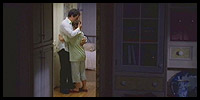 "Spanglish" dabbles in the possibility of a romance between John and Flor during the third act, but wisely does not go through with it, where they stand with each other beautifully signified by Flor's words to him right before she places her feet on the hardwood floor. Where everyone else stands with each other is not as clear at the conclusion of "Spanglish," which volunteers a number of nicely modulated moments and brisk humor amidst a slimly formed plot whose thematic relevance turns out to be disappointingly elementary. When the film ends, what has occurred and not been resolved leaves a bad taste in your mouth. "Spanglish" wishes to be full of good will, but it is hampered by an unnecessarily extreme mean streak that the picture refuses to be accountable for.
"Spanglish" dabbles in the possibility of a romance between John and Flor during the third act, but wisely does not go through with it, where they stand with each other beautifully signified by Flor's words to him right before she places her feet on the hardwood floor. Where everyone else stands with each other is not as clear at the conclusion of "Spanglish," which volunteers a number of nicely modulated moments and brisk humor amidst a slimly formed plot whose thematic relevance turns out to be disappointingly elementary. When the film ends, what has occurred and not been resolved leaves a bad taste in your mouth. "Spanglish" wishes to be full of good will, but it is hampered by an unnecessarily extreme mean streak that the picture refuses to be accountable for.
|
© 2004 by Dustin Putman |














